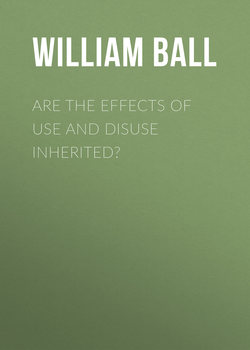Читать книгу Are the Effects of Use and Disuse Inherited? - Ball William Platt - Страница 11
SPENCER'S EXAMPLES AND ARGUMENTS
ÆSTHETIC FACULTIES
ОглавлениеThe modern development of music and harmony (p. 19) is undeniable, but why could it only have been brought about by the help of the inheritance of the effects of use? Why are we to suppose that "minor traits" such as the "æsthetic perceptions" cannot have been evolved by natural selection (p. 20) or by sexual selection? Darwin holds that our musical faculties were developed by sexual preference long before the acquisition of speech. He believes that the "rhythms and cadences of oratory are derived from previously developed musical powers" – a conclusion "exactly opposite" to that arrived at by Mr. Spencer.12 The emotional susceptibility to music, and the delicate perceptions needed for the higher branches of art, were apparently the work of natural and sexual selection in the long past. Civilization, with its leisure and wealth and accumulated knowledge, perfects human faculties by artificial cultivation, develops and combines means of enjoyment, and discovers unsuspected sources of interest and pleasure. The sense of harmony, modern as it seems to be, must have been a latent and indirect consequence of the development of the sense of hearing and of melody. Use, at least, could never have called it into existence. Nature favours and develops enjoyments to a certain extent, for they subserve self-preservation and sexual and social preference in innumerable ways. But modern æsthetic advance seems to be almost entirely due to the culture of latent abilities, the formation of complex associations, the selection and encouragement of talent, and the wide diffusion and imitation of the accumulated products of the well-cultivated genius of favourably varying individuals. The fact that uneducated persons do not enjoy the higher tastes, and the rapidity with which such tastes are acquired or professed, ought to be sufficient proof that modern culture is brought about by far swifter and more potent influences than use-inheritance. Neither would this hypothetical factor of evolution materially aid in explaining the many other rapid changes of habit brought about by education, custom, and the changed conditions of civilization generally. Powerful tastes – as is incontestably shown in the cases of alcohol and tobacco – lie latent for ages, and suddenly become manifest when suitable conditions arise. Every discovery, and each step in social and moral evolution, produces its wide-spreading train of consequences. I see no reason why use-inheritance need be credited with any share in the cumulative results of the invention of printing and the steam-engine and gunpowder, or of freedom and security under representative government, or of science and art and the partial emancipation of the mind of man from superstition, or of the innumerable other improvements or changes that take place under modern civilization.
Mr. Spencer suggests an inquiry whether the greater powers possessed by eminent musicians were not mainly due to the inherited effect of the musical practice of their fathers (p. 19). But these great musicians inherited far more than their parents possessed. The excess of their powers beyond their parents' must surely be attributed to spontaneous variation; and who shall say that the rest was in any way due to use-inheritance? If, too, the superiority of geniuses proves use-inheritance, why should not the inferiority of the sons of geniuses prove the existence of a tendency which is the exact opposite of use-inheritance? But nobody collects facts concerning the degenerate branches of musical families. Only the favourably varying branches are noticed, and a general impression of rapid evolution of talent is thus produced. Such cases might be explained, too, by the facts that musical faculty is strong in both sexes, that musical families associate together, and that the more gifted members may intermarry. Great musicians are often astonishingly precocious. Meyerbeer "played brilliantly" at the age of six. Mozart played beautifully at four. Are we to suppose that the effect of the adult practice of parents was inherited at this early age? If use-inheritance was not necessary in the case of Handel, whose father was a surgeon, why is it needed to account for Bach?
12
Descent of Man, pp. 573, 572, and footnote.
